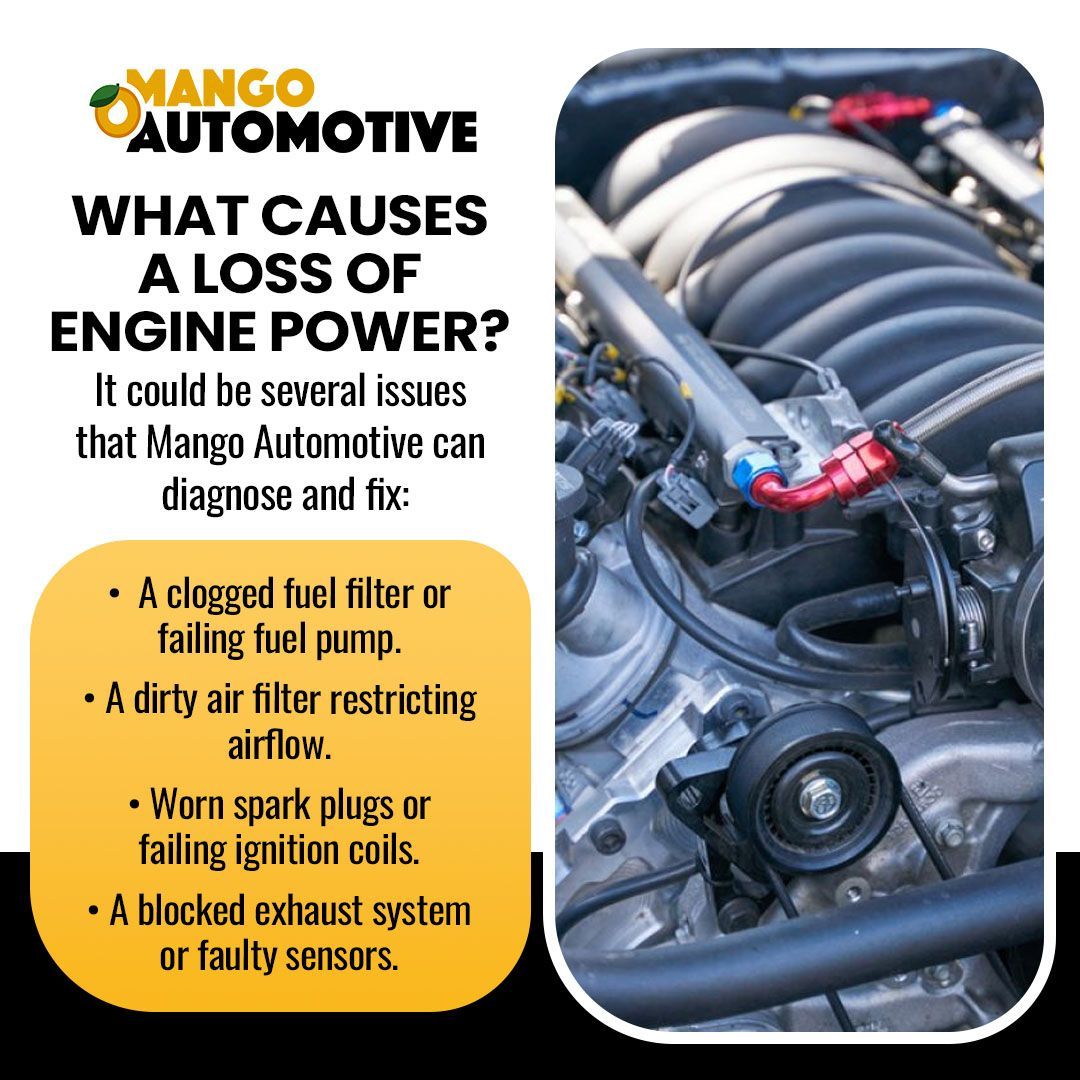Loss of Engine Power: Expert Auto Mechanics in Albuquerque Explain the Repairs
Loss of engine power happens when faulty components disrupt fuel delivery, airflow, ignition timing, or exhaust flow, causing your vehicle to activate protective systems that reduce performance. At Mango Automotive (Downtown), our team of certified auto mechanics in Albuquerque uses advanced diagnostic equipment to identify the root cause and restore your vehicle's full power.
Engine power loss affects thousands of Albuquerque drivers annually. Whether you experience a gradual decline in performance or sudden power reduction, understanding the causes and solutions helps you respond appropriately.

What Reduced Engine Power Means for Your Vehicle
Reduced engine power represents your vehicle's protective response to detected malfunctions. When sensors or control modules identify abnormal readings, the Engine Control Unit (ECU) activates a fail-safe mode that limits speed, restricts gear selection, and reduces throttle response.
The ECU serves as your vehicle's computer brain, monitoring hundreds of parameters every second. When it detects values outside normal operating ranges, it immediately restricts engine output to protect internal components from catastrophic failure.
Modern vehicles use this safety feature across all makes and models. You might see warning messages like "Engine Power Reduced," "Service Engine Soon," or simply notice your check engine light illuminated alongside performance issues.
Limp Mode Protection System
Limp mode, also called limp home mode, limits your vehicle to approximately 30-45 mph and restricts engine speed to 2,000-3,000 RPM. This protective state allows you to drive to a repair facility without causing additional engine damage.
Your transmission may lock in second or third gear, preventing shifts to higher gears. Non-essential systems like air conditioning often shut down to reduce strain on the engine. The system doesn't activate for minor issues. When your vehicle enters this state, immediate professional diagnosis becomes necessary to identify and resolve the underlying problem.
Mango Automotive's qualified
mechanics in Downtown Albuquerque use specialized diagnostic equipment to determine why your vehicle entered protection mode and perform the necessary repairs to restore normal operation safely.
Common Causes of Engine Power Loss
Multiple systems contribute to engine performance. Problems in any of these areas can trigger power reduction or complete limp mode activation.
Fuel System Failures
Clogged fuel filters, failing fuel pumps, and malfunctioning fuel injectors prevent proper fuel delivery to the combustion chamber, resulting in immediate power loss.
The fuel filter removes contaminants before they reach your engine. After filtering fuel for a long time, this component becomes clogged with particles and restricts flow. When your engine demands more fuel during acceleration, a clogged filter cannot supply adequate volume, causing hesitation and power loss.
Fuel pumps maintain precise pressure throughout the fuel system. A pump operating below specification delivers insufficient fuel under load conditions. You'll notice this most during acceleration or when climbing hills, as these situations demand maximum fuel flow.
Fuel injectors spray atomized fuel into each cylinder at exact intervals. Carbon deposits accumulate on injector nozzles over time, disrupting the spray pattern and reducing fuel delivery.
Air Intake System Problems
Restricted airflow from clogged air filters, dirty throttle bodies, or failed Mass Airflow Sensors (MAF) disrupts the air-fuel mixture needed for proper combustion.
Your engine requires precise air-to-fuel ratios for proper combustion. The air filter captures dust, pollen, and debris before they enter the intake system. In Albuquerque's desert environment, air filters accumulate contaminants rapidly. A severely restricted filter starves the engine of oxygen, particularly noticeable during acceleration when airflow demands increase.
The throttle body controls airflow volume based on accelerator pedal position. Carbon deposits on the throttle plate prevent proper sealing and accurate control. This causes rough idle, hesitation, and reduced power output.
The Mass Airflow Sensor measures incoming air volume and density, sending this data to the ECU. The computer uses these readings to calculate the required fuel delivery. A malfunctioning MAF sensor provides incorrect data, causing the ECU to miscalculate fuel needs. Your engine might run too rich or too lean, both conditions that reduce power and trigger warning lights.
Ignition System Malfunctions
Worn spark plugs, failing ignition coils, and damaged wiring prevent proper combustion, causing misfires and noticeable power reduction.
Spark plugs create the electrical arc that ignites the air-fuel mixture in each cylinder. As plugs age, the electrode gap widens and the insulator deteriorates. Weak or inconsistent sparks result in incomplete combustion, reducing power output and increasing fuel consumption.
Ignition coils convert battery voltage into the high-voltage required by spark plugs. Modern engines use individual coils for each cylinder. When a coil fails, that cylinder stops firing, creating a misfire condition.
Damaged spark plug wires or connectors allow electrical current to arc to ground rather than reaching the spark plug. This causes intermittent misfires that worsen under load conditions.
Exhaust System Restrictions
Clogged catalytic converters and exhaust leaks prevent proper gas flow, causing back pressure that reduces engine power.
The catalytic converter reduces harmful emissions by converting pollutants into less toxic compounds. Internal catalyst material can deteriorate and block exhaust flow. Back pressure builds in the exhaust system, making it difficult for the engine to expel combustion gases.
Without proper exhaust evacuation, the engine cannot complete the combustion cycle efficiently.
When exhaust leaks develop between the engine and oxygen sensors, they pull outside air into the exhaust stream. The oxygen sensors detect this extra air and signal the ECU that the engine runs too lean. The computer adds more fuel to compensate, but the problem persists, eventually triggering power reduction.
Sensor and Electronic Failures
Faulty Throttle Position Sensors (TPS), oxygen sensors, and ECU malfunctions send incorrect data that triggers protective power limitations.
The TPS tells the ECU how far you've pressed the accelerator pedal. A failing TPS sends erratic or incorrect position data. The ECU cannot determine your power demands accurately, resulting in poor acceleration response and unexpected power delivery.
Oxygen sensors monitor exhaust gases to help the ECU maintain proper air-fuel ratios. Vehicles typically have two to four oxygen sensors. When these sensors fail, the ECU cannot adjust fuel delivery accurately, causing poor performance and increased emissions.
Wiring problems create intermittent connections that confuse the ECU. Corroded connectors, damaged wire insulation, and loose grounds generate fault codes. In some cases, the ECU itself experiences internal failures that require replacement or reprogramming.
Turbocharger and Boost Pressure Issues
Turbocharger failures and air pressure leaks cause dramatic power loss in turbocharged engines.
Turbocharged engines use a special pump called a turbocharger to force extra air into the engine, creating more power than the engine could produce on its own. The turbocharger spins using exhaust gases leaving your engine. When the turbocharger breaks or stops working properly, your engine loses this extra power boost and performs like a regular engine with noticeably less strength.
Air leaks can develop at connection points throughout the turbo system. Even small leaks reduce the air pressure your engine receives. When the vehicle's computer detects lower-than-expected air pressure, it may activate limp mode to protect the engine from running incorrectly.
The wastegate acts as a pressure relief valve for the turbo system. When this valve gets stuck, your engine receives either too much or too little pressurized air. Too much pressure can damage engine parts, while too little pressure reduces the performance benefit you expect from a turbocharged engine.
The various causes of engine power loss require systematic diagnosis to identify the specific problem affecting your vehicle. At Mango Automotive, our experienced auto mechanics in Albuquerque have the training and diagnostic equipment to accurately determine which system is causing your power loss. We use proven testing procedures to pinpoint the exact component failure, saving you time and money while restoring your vehicle's performance.
Professional Engine Diagnostics in Downtown Albuquerque
Modern vehicles store detailed information about detected problems, and accessing this data requires professional diagnosis.
OBD-II Scanning and Code Analysis
Professional OBD-II scanning retrieves trouble codes, freeze frame data, and live sensor readings that pinpoint system failures causing power loss. The On-Board Diagnostics II (OBD-II) system serves as your vehicle's self-monitoring network. This standardized interface allows diagnostic tools to communicate with the ECU and retrieve stored information about detected faults.
At Mango Automotive, we connect professional-grade diagnostic scanners to your vehicle's OBD-II port. These tools communicate with all control modules, retrieving stored trouble codes and freeze frame data captured when the fault occurred.
Trouble codes provide starting points for diagnosis, but rarely tell the complete story. For example, code P0171 indicates "System Too Lean Bank 1," but doesn't specify whether the problem stems from a vacuum leak, faulty MAF sensor, or fuel delivery issue. Our mechanics in Downtown Albuquerque use code information combined with visual inspection and testing to pinpoint exact failures.
Advanced Diagnostic Procedures
Live data analysis reveals system performance in real time. We monitor sensor readings during test drives, observing how components respond under various load conditions. This identifies intermittent problems that don't always trigger stored codes.
After initial code retrieval, our technicians perform targeted component tests. Visual inspection often reveals obvious problems like damaged wiring, disconnected sensors, or fluid leaks. Our experienced auto mechanics combine diagnostic data with hands-on evaluation to develop accurate repair plans.
Effective Repairs for Power Loss Problems
Once we identify the cause, our certified technicians perform repairs using quality parts and proven procedures.
Fuel System Repairs
- Fuel filter replacement - Restores proper fuel flow; typically replaced every 30,000-50,000 miles.
- Fuel pump replacement - Necessary when pumps cannot deliver adequate fuel pressure.
- Fuel injector service - Removes carbon buildup through cleaning or replacement.
Air Intake System Service
- Air filter replacement - Provides immediate improvement; recommended every 15,000 miles in Albuquerque.
- Throttle body cleaning - Removes deposits causing rough idling and poor acceleration.
- Mass airflow sensor service - Corrects measurement problems through cleaning or replacement.
Ignition System Repairs
- Spark plug replacement - Prevents misfires; replaced every 60,000-100,000 miles.
- Ignition coil replacement - Fixes misfires from failed coils.
- Wiring repairs - Corrects damaged connections causing electrical problems.
Exhaust System Solutions
- Catalytic converter replacement - Resolves blockages restricting gas flow.
- Exhaust leak repairs - Replaces gaskets, repairs manifolds, or replaces damaged pipes.
Electronic System Repairs
- Sensor replacement - Corrects faulty readings from throttle position sensors and oxygen sensors
- Computer reprogramming or replacement - Addresses software issues or failed control units
- Electrical wiring repairs - Repairs damaged wires and cleans corroded connectors
Mango Automotive for Engine Repairs in Albuquerque
Mango Automotive combines advanced diagnostic capabilities with experienced technicians to resolve power loss issues efficiently.
Advanced Diagnostic Equipment
We use the latest diagnostic technology to identify problems quickly and accurately. Our equipment includes manufacturer-specific diagnostic tools that access proprietary systems beyond generic OBD-II capabilities.
Professional
engine diagnostics in Downtown Albuquerque requires both sophisticated equipment and trained technicians who understand how to interpret diagnostic data. Our team receives ongoing training on emerging automotive technology. We stay current with technical service bulletins, manufacturer updates, and diagnostic procedures for all vehicle makes and models.
Industry-Leading Warranty
Our 60-month/60,000-mile warranty demonstrates confidence in our work quality. This coverage includes 36 months/36,000 miles nationwide plus an additional 24 months/24,000 miles at our locations. This warranty protection exceeds industry standards and provides security for your automotive repair investment. We stand behind every repair with parts and labor coverage that protects you from unexpected failures.
Customer-Focused Service
We built our business around your needs and schedule. Our comfortable waiting areas feature amenities that make necessary repairs less disruptive to your day. We provide clear communication about repair needs, costs, and timeline expectations.
Our location at 700 Central Ave SW in Downtown Albuquerque provides convenient access for city residents and nearby areas. We understand the importance of getting your vehicle back on the road quickly without sacrificing repair quality.
Our commitment to honest, transparent service has earned us strong customer loyalty. One recent client shared: "I was referred to Mango Automotive on Central by Jiffy Lube on Coors and Irving, and I'll definitely be referring Mango Automotive to my family and friends. I really appreciate their honesty, how clearly they explained the issues, and how quickly everything was taken care of. Their pricing is also very reasonable, which I truly value."
This customer came to us with an engine light issue requiring oxygen sensor replacement and vehicle inspection. Our mechanics in Downtown Albuquerque diagnosed the problem accurately, explained the necessary repairs clearly, and completed the work quickly at fair prices. This approach to service reflects our commitment to building lasting relationships with every customer who trusts us with their vehicle.
Addressing Engine Power Loss Promptly
Loss of engine power requires immediate attention to prevent additional damage and restore safe vehicle operation. Continuing to drive with reduced power risks complete engine failure and considerably higher repair costs.
Our certified auto mechanics in Albuquerque use systematic diagnostic procedures to identify exact causes rather than replacing parts based on guesswork. This approach saves you money while resolving problems correctly the first time.
Whether you experience sudden power loss or gradual performance decline, our team provides the expertise and equipment needed to diagnose and repair your vehicle properly. We handle all makes and models with the same attention to detail and commitment to quality.
Don't ignore warning lights or performance problems. Contact Mango Automotive today at
(505) 764-8698 to schedule professional engine diagnostics in Downtown Albuquerque. Trust our diligent, fast, and reliable service to get you back on the road with confidence.














